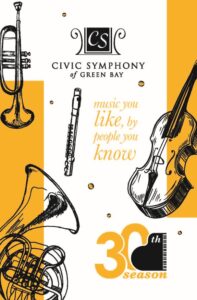Program Notes
Level Up (Video Game Music)
Civic Symphony of Green Bay
Saturday, May 31, 2025
The Weidner
OVERVIEW
Be swept away with stunning arrangements of symphonic soundtracks from blockbuster video games. This concert features music from The Legend of Zelda, Medal of Honor, Undertale, and the Final Fantasy series of games. Plus you’ll enjoy Baba Yetu (Civilization IV), Dragonborn (Skyrim), and themes from newer games such as Helldivers 2. Or just tap your toes to the well-known Super Mario. There’s something for everyone, gamers and non-gamers alike! The orchestra will be joined on stage by singers from the Dudley Birder Chorale.
Visit the lobby to experience various games and activities related to gaming. We thank Edge VR Arcade & Game Trade for generously donating their time and services to make this concert memorable. Check out our themed raffle baskets and silent auction, or purchase bottled water and chocolate bars. All funds raised at this afternoon's concert will help support music purchases and rentals.
The orchestra thanks Bill Burroughs and Shahnnon Hawkins for sponsoring the rental costs for our performance of Baba Yetu. We also thank Dan & Timberly Marbes for donating to help cover facility fees for today’s concert.
This concert is presented in partnership and with support from The Weidner.
REPERTOIRE
Click a title below to expand and read about the pieces on today’s program. We hope you learn something new and interesting about the composers and the music. If you have time in the next two weeks, please share your feedback in our concert survey.
Remember to silence your cell phone and refrain from texting, audio/video recording, or flash photography during the performance.
AT A GLANCE
Title: The Legend of Zelda (Main Theme)
Composed by: Koji Kondo (b. 1961), arranged by Gabriele Delfino
Game released: 1986
Length: 4.5 minutes
Instrumentation: 2 flutes + piccolo, 2 oboes + English horn, 2 clarinets + bass clarinet, 2 bassoons, 4 horns, 3 trumpets, 3 trombones, tuba, timpani, percussion (bass drum, cymbals, glockenspiel, snare drum, tubular bells, wind chimes), harp, chorus, and strings
CSGB premiere performance

The Legend of Zelda
ABOUT THE COMPOSER
- Born in Japan in 1961
- Senior executive of Nintendo EPD (Entertainment Planning and Development)
- One of the most recognized video game composers in the world
ABOUT THE MUSIC
Composed by Koji Kondo, the main theme from The Legend of Zelda is one of the most prolific and recognizable video game scores. Despite its legacy, it was a late addition to the beloved action-adventure game’s soundtrack. Kondo’s original intent was to use Maurice Ravel’s Bolero as the music for the opening title screen. However, at the time, Bolero was still under copyright protection. The orchestra will explore the celebrated main theme of The Legend of Zelda this afternoon. This particular arrangement made its debut at The Legend of Zelda 25th Anniversary Symphony concert series.
ABOUT THE GAME
The very first installment of one of the most well-known game franchises in video game history, The Legend of Zelda, was first released in 1986. It was created by world-renowned game designers Shigeru Miyamoto and Takashi Tezuka with music composed by video game industry giant Koji Kondo. Based in the land of Hyrule, the stories follow Zelda (the Princess of Hyrule) and Link (the main protagonist) as he battles against the forces of villainous Ganondorf. The gameplay of the first game in the franchise was groundbreaking for the video game industry. It introduced players to a semi-open-world experience combining exploration, combat, and puzzle-solving.
AT A GLANCE
Title: Super Mario Suite
Composed by: Koji Kondo (b. 1961), arranged by Hai Mai
Game released: 1985, additional games/themes from the 1980s & 2000s
Length: 11 minutes
Instrumentation: 2 flutes + piccolo, 2 oboes, 3 clarinets, 2 bassoons, 4 horns, 3 trumpets, 2 trombones, tuba, timpani, percussion (bass drum, cymbals, glockenspiel, marimba, snare drum, tam-tam), piano, and strings
CSGB premiere performance

Super Mario Bros.
MORE ABOUT THE COMPOSER
- A classically trained pianist
- Super Mario Bros. became Kondo’s largest success
- Musical influences include Deep Purple, Herbie Hancock, Casiopea, and Chick Corea
ABOUT THE MUSIC
The early years of video game creation saw music as something only to draw attention to a game. But Kondo’s writing and composition caused a shift in the industry. He used music to enhance a game and its stories in the way movies use music to set tone and atmosphere, enhance emotional impact, and support narratives. In 2023, the Overworld Theme from Super Mario Bros. became the first piece of music from a video game to be included in the American National Recording Registry. Super Mario Suite is a menagerie of many different themes from several Super Mario titles, both old and new. The melodies move throughout the orchestra to enhance and outline the various sound atmospheres heard in the games.
ABOUT THE GAME
The first Super Mario Bros. video game debuted in the United States on the Nintendo Entertainment System (NES) in 1985. The game has grown into a long line of Super Mario titles where the player controls the main character Mario. Other characters such as his brother Luigi, Princess Peach, Toad, and Yoshi can be controlled by the player in later titles. The games commonly follow the adventures of Mario and Luigi through the Mushroom Kingdom. They fight against the forces of Bowser (also known as King Koopa) who is trying to usurp the throne and control the Mushroom Kingdom.
AT A GLANCE
Title: Medal of Honor (Main Theme)
Composed by: Michael Giacchino (b. 1967)
Game released: 2010
Length: 4 minutes
Instrumentation: 2 flutes + piccolo, 2 oboes + English horn, 2 clarinets + bass clarinet, 2 bassoons, 4 horns, 3 horns, 3 trombones, tuba, timpani, percussion (bass drum, chimes, crash cymbals, low tom, snare drum, suspended cymbal, tam-tam), piano, harp, chorus, and strings
Previous CSGB performance:
2024 June

Medal of Honor
ABOUT THE COMPOSER
- Born in New Jersey in 1967
- Attended the School of Visual Arts in NYC
- Plays piano, organ, guitar, and cello
ABOUT THE MUSIC
Michael Giacchino was chosen by the prolific film director Steven Spielberg to compose the music for Medal of Honor after Spielberg heard Giacchino’s work on the video game adaptation of The Lost World: Jurassic Park. The original soundtrack for Medal of Honor was recorded with members of the Seattle Symphony. The main theme from Medal of Honor is a very robust piece amplifying the story of World War II. The music uses movie-level orchestration and scoring to highlight the themes of courage, sacrifice, and heroism.
ABOUT THE GAME
Medal of Honor was developed in the 1990s by game company DreamWorks Interactive and published by Electronics Arts for the original PlayStation game console. The narrative of the game was created by Steven Spielberg who had a deep interest in World War II. Spielberg said further inspiration came to him from watching his own son play the game GoldenEye 007 for the Nintendo 64 game console. The first installment of the Medal of Honor series tells the story of the character Lt. Jimmy Patterson, an Office of Strategic Services (OSS) operative. The player controls Lt. Patterson through many missions ranging from retrieving documents, sabotage of enemy operations, and rescue of Allied Forces. The game received critical acclaim for historical accuracy and innovative gameplay.
AT A GLANCE
Title: Gerudo Valley (from The Legend of Zelda: Ocarina of Time)
Composed by: Koji Kondo (b. 1961), arranged by Andrés Soto
Game released: 1998
Length: 3.5 minutes
Instrumentation: 2 flutes + piccolo, 2 oboes, 2 clarinets + bass clarinet, 2 bassoons, 4 horns, 3 trumpets, 3 trombones, tuba, timpani, percussion (crash cymbals, marimba, suspended cymbal, timbales, vibraphone, xylophone), harp, and strings
CSGB premiere performance

The Legend of Zelda: Ocarina of Time
ABOUT THE MUSIC
The Gerudo Valley theme features Spanish-inspired rhythm, displaying a fiery interplay between flamenco-style guitars and dramatic strings. The bold and adventurous melody evokes imagery of the Gerudo Valley in the game. As the music unfolds, it captures both the mystery of the desert sands and the vitality of the people, known as the Gerudo. The version we will play this afternoon is an arrangement written for The Legend of Zelda 30th Anniversary concert series. Arranged for a full symphony orchestra, the music contains enhanced dramatics with large contrasts in dynamics, rhythm, and emotion. The melody is shared by almost every section in the orchestra throughout the piece.
ABOUT THE GAME
The Gerudo Valley theme is heard in the Nintendo 64 action-adventure title The Legend of Zelda: Ocarina of Time, developed by Nintendo’s division of Entertainment Analysis and Development. It was the first game in the franchise to use three-dimensional graphics. Receiving critical acclaim, many video game industry experts consider The Legend of Zelda: Ocarina of Time to be the greatest video game of all time. It currently sits as the No. 1 highest-rated game on the website Metacritic with a score of 99 out of 100.
The game follows the same three main characters as previous installments of The Legend of Zelda: Link, Princess Zelda, and the evil Ganondorf in the kingdom of Hyrule. The most iconic item in the game is a musical instrument, the ocarina. Throughout the game the player learns 12 different melodies to solve puzzles, trigger game events, and teleport to different locations while controlling the character, Link. The locale of Gerudo Valley in the game leads to a fortress controlled by a race of thieves called the Gerudo. Link must adventure his way into the fortress to rescue allies and continue his quest to defeat Ganondorf.
AT A GLANCE
Title: Megalovania (from Undertale)
Composed by: Toby Fox (b. 1991), arranged by Andrés Soto
Game released: 2015
Length: 4 minutes
Instrumentation: 2 flutes, 2 oboes, 2 clarinets, 2 bassoons, 4 horns, 3 trumpets, 3 trombones, tuba, timpani, percussion (bass drum, crash cymbals, glockenspiel, snare drum, suspended cymbal, tambourine, tam-tam, tubular bells, xylophone), piano, harp, chorus, and strings
CSGB premiere performance

Undertale
ABOUT THE COMPOSER
- Born in New Hampshire in 1991
- Drew early inspirations from RPG (role-playing game) video games including Final Fantasy VI and Super Mario RPG
- Also contributed to the soundtracks of Super Smash Bros. Ultimate and Pokémon
ABOUT THE MUSIC
The track Megalovania is arguably the most recognizable song from the video game Undertale. It is the music playing in the background of the boss fight with Sans. The music helps create an on-the-edge, driven feel to the encounter. The rhythmic melodies and seemingly frenetic pace help mirror the unrelenting feel of the boss fight. The music in the game is written in a chiptune / 8-bit retro style. Today’s arrangement for full orchestra will attempt to re-recreate the intense, hectic feel of the boss encounter in the game.
TRANSLATION
Latin:
Sans! Sans!
Noli venire si amicus sei.
English:
Sans! Sans!
Do not come if you are a friend.
ABOUT THE GAME
Created by Toby Fox and released in 2015, Undertale is a role-playing video game following the story of a “child” of unknown name who falls into the Underground, a region below the surface of the Earth. The region is separated by a magical, impenetrable barrier. The player controls the child’s journey to get back to the surface of the Earth. Along the way, the player encounters many monsters and mystical creatures – some are helpful to the player and some are hostile. The player has three options when interacting with a monster: kill, befriend, or flee. The ending of the game changes based on the choices the player makes when encountering these monsters.
AT A GLANCE
Title: Baba Yetu (from Sid Meier’s Civilization IV)
Composed by: Christopher Tin (b. 1976)
Game released: 2005
Length: 3.5 minutes
Instrumentation: 2 flutes, 2 oboes, 2 clarinets, 2 bassoons, 4 horns, 3 trumpets, 3 trombones, tuba, timpani, percussion (ashiko, bass drum, caxixi, finger cymbals, shaker, suspended cymbal, taiko, tam-tam), piano, harp, chorus, and strings
CSGB premiere performance

Sid Meier’s Civilization IV
ABOUT THE COMPOSER
- Born in California in 1976
- Admitted to the Royal College of Music
- Received the first Fulbright Scholarship awarded for film scoring
ABOUT THE MUSIC
Baba Yetu is the main theme song for the 2005 game Sid Meier’s Civilization IV. The lyrics are “The Lord’s Prayer” translated into Swahili. The piece is perfectly placed at the start of the game as the background music for the main menu screen. The song reflects the game’s theme of humanity’s shared journey through history. Baba Yetu earned Christopher Tin both a Grammy nomination and win in 2011 – becoming the first piece of music composed for a video game to be nominated and win a Grammy Award. This feat also awarded Tin a record in the Guiness Book of World Records as “The composer of the first video game theme to win a Grammy Award.”
TRANSLATION
Swahili adaptation of The Lord’s Prayer by Chris Kiagiri
Swahili:
Baba yetu, yetu uliye
Mbinguni yetu, yetu amina!
Baba yetu, yetu uliye
Jina lako litukuzwe.
Utupe leo chakula chetu
Tunachohitaji utusamehe
Makosa yetu, hey!
Kama nasi tunavyowasamehe
Waliotukosea usitutie
Katika majaribu, lakini
Utuokoe, na yule, muovu e milele!
Ufalme wako ufike utakalo
Lifanyike duniani kama mbinguni.
(Amina)
English:
Our Father, who art
In Heaven. Amen!
Our Father,
Hallowed be thy name.
Give us this day our daily bread,
Forgive us of
Our trespasses
As we forgive others
Who trespass against us
Lead us not into temptation, but
Deliver us from the evil one forever.
Thy kingdom come, thy will be done
On Earth as it is in Heaven.
(Amen)
ABOUT THE GAME
Created by Soren Johnson, Sid Meier’s Civilization IV was developed by Firaxis Games and published by video game publisher 2K in October 2005. Also known as Civ IV, the game is a turn-based strategy game played similarly to a tabletop board game. It can be played by multiple human players or by one or more human players who play cooperatively or independently against computer controlled factions. All factions begin the game in the Ancient Era covering the Prehistoric Era to Classical Antiquity of human history. Through completing achievements and goals, the factions advance forward through human history into the Classical Era (500 BCE to 500 CE), the Medieval Era (500 CE to 1500), the Renaissance Era (1500 to 1750), the Industrial Era (1750 to 1900), the Modern Era (1900 to 1950), and finally the Future Era (post-21st century). Each advancement offers improved stats, abilities, and game options which are used to attempt to win the game.
There are five possible ways to win the game:
- Defeat all other civilizations by military conquest
- Control two-thirds of the game map and population
- Build the first spaceship in the Space Age and travel to the nearby star system Alpha Centauri
- Have the most dominant “Culture Ratings” over other civilizations
- Being elected as the “World Leader” by the United Nations
AT A GLANCE
Title: Halo Theme (from Halo Suite)
Composed by: Marty O’Donnell (b. 1955) and Michael Salvatori (b. 1954), arranged by Bob Phillips
Game released: 2001
Length: 4.5 minutes
Instrumentation: cello ensemble
CSGB premiere performance

Halo
ABOUT THE COMPOSERS
- Both are American composers
- Frequently collaborated on music for the Halo video games
- Formed a partnership and eventually created their own production company, TotalAudio
ABOUT THE MUSIC
The original Halo soundtrack features a wide range of musical styles, including chanting, string orchestra, and percussion. O’Donnell drew inspiration for the theme from “Yesterday” by The Beatles. The theme premiered at the 1999 Macworld Conference & Expo. The arrangement you’ll hear today was adapted for cello ensemble by our principal cellist, Adam Korber.
ABOUT THE GAME
Halo: Combat Evolved (the first in the Halo series) is a first-person shooter video game developed by Bungie and published by Microsoft Game Studios for the Xbox. The game is set in the 26th century, where the player is a cybernetically enhanced supersoldier called Master Chief accompanied by an artificial intelligence named Cortana. Players battle aliens and try to uncover secrets of the eponymous Halo, a ring-shaped artificial world.
AT A GLANCE
Title: Super Mario Galaxy Symphonic Suite
Composed by: Mahito Yokota (b.1974) & Koji Kondo (b. 1961), arranged by Andrés Soto
Game released: 2007
Length: 14 minutes
Instrumentation: 2 flutes, 2 oboes, 2 clarinets, 2 bassoons, 4 horns, 3 trumpets, 3 trombones, tuba, timpani, percussion (bass drum, congas, crash cymbals, glockenspiel, snare drum, suspended cymbal, tam-tam, toms, tubular bells, vibraphone), piano, harp, and strings
CSGB premiere performance

Super Mario Galaxy
ABOUT MAHITO YOKOTA
- Born in Japan in 1974
- Game composer and sound crew member at Nintendo
- First title at Nintendo was Donkey Kong: Jungle Beats for the GameCube
ABOUT THE MUSIC
The music of Super Mario Galaxy was co-written by both Koji Kondo and Mahito Yokota. The first draft of the soundtrack, entirely composed by Mahito, was written with Latin-American musical influence. It was rejected by Kondo. Months later, Mahito presented three other variations of music to Shigeru Miyamoto who was one of the producers of the game. One variation was completely orchestral, another had a pop music influence, and the third had a mix of orchestral and pop influences. Miyamoto chose the orchestral version as it had a more “space-like” feel matching better with the galactic feel of the game. Today’s arrangement will feature several different themes and melodies highlighting the moods and settings of Super Mario Galaxy.
ABOUT THE GAME
Released in 2007, Super Mario Galaxy grew to receive critical acclaim. It is currently the fourth highest rated game on the website Metacritic with a score of 97. The game follows the adventures of Mario in the Mushroom Kingdom. The opening of the game illuminates the Star Festival, an celebratory event to observe a comet which comes once every 100 years. But the festival is interrupted by Bowser with a fleet of airships and a flying saucer he uses to capture Princess Peach along with her castle. Mario must adventure and quest, hopping from galaxy to galaxy collecting Power Stars to power up the game’s central hub called the Comet Observatory. Once fully powered, Mario can travel to the center of the universe where Bowser has taken Peach, and Mario rescues her.
AT A GLANCE
Title: Dragonborn (from The Elder Scrolls V: Skyrim)
Composed by: Jeremy Soule (b. 1975), arranged by Andrés Soto
Game release: 2011
Length: 3.5 minutes
Instrumentation: 2 flutes + piccolo, 2 oboes + English horn, 2 clarinets + bass clarinet, 2 bassoons, 4 horns, 3 trumpets, 3 trombones, tuba, timpani, percussion (bass drum, crash cymbals, mark tree, snare drum, suspended cymbal, 3 taiko, tam-tam), chorus, and strings
CSGB premiere performance

The Elder Scrolls V: Skyrim
ABOUT THE COMPOSER
- Born in Iowa in 1975
- Began private music lessons in sixth grade with professors from Western Illinois University
- Spent one year creating a composition portfolio post-high school to present to game company SquareSoft and was hired two weeks after submitting
ABOUT THE MUSIC
Dragonborn is the most iconic track from the video game The Elder Scrolls V: Skyrim. It’s an uplifting, bold piece written for full orchestra and men’s choir. The lyrics detail the prophecy of the “Dragonborn” who will come to defeat the evil Alduin, the World-Eater and are written in a fictional language known as Dragon-tongue. The use of vibrant brass and powerful drums and strings create an ambience of fantasy and heroism.
TRANSLATION
Dragon-tongue:
Dovahkiin, Dovahkiin, naal ok zin los vahriin,
Wah dein vokul mahfaeraak ahst vaal!
Ahrk fin norok paal graan fod nust hon zindro zaan,
Dovahkiin, fah hin kogaan mu draal!
Huzrah nu, kul do od, wah aan bok lingrah vod,
Ahrk fin tey, boziik fun, do fin gein!
Wo lost fron wah ney dov, ahrk fin reyliik do jul,
Voth aan suleyk wah ronit faal krein
Ahrk fin Kel lost prodah, do ved viing ko fin krah,
Tol fod zeymah win kein meyz fundein!
Alduin, feyn do jun, kruziik vokun staadnau,
Voth aan bahlok wah diivon fin lein!
Nuz aan sul, fent alok, fod fin vul dovah nok,
Fen kos nahlot mahfaeraak ahrk ruz!
Paaz Keizaal fen kos stin nol bein Alduin jot!
English:
Dragonborn, Dragonborn, by his honor is sworn,
To keep evil forever at bay!
And the fiercest foes rout when they hear triumph’s shout,
Dragonborn, for your blessing we pray!
Hearken now, sons of snow to an age long ago,
And the tale, boldly told, of the one!
Who was kin to both wyrm, and the races of man,
With a power to rival the sun!
And the scrolls have forefold, of black wings in the cold,
That when brothers wage war come unfurled!
Alduin, Bane of Kings, ancient shadow unbound,
With a hunger to swallow the world!
But a day shall arise, when the dark dragon’s lies
Will be silenced forever and then!
Fair Skyrim will be free from foul Alduin’s maw!
ABOUT THE GAME
Released in 2011 and published by Bethesda Softworks, The Elder Scrolls V: Skyrim is the fifth installment of The Elder Scrolls series for the PlayStation 3, Xbox 360, and Windows platforms. It follows the tale of the “Last Dragonborn,” who is controlled by the player. Set in the fictional fantasy realm of Tamriel, the player quests to gather resources, tools, and increases in-game character stats to eventually defeat the god-king Alduin, the World-Eater.
AT A GLANCE
Title: To Zanarkand (from Final Fantasy X)
Composed by: Nobuo Uematsu (b. 1959), arranged by Andrés Soto
Game released: 2001
Length: 4.5 minutes
Instrumentation: 2 flutes, 2 oboes, 2 clarinets, 2 bassoons, 4 horns, 3 trumpets, 3 trombones, tuba, timpani, percussion (glockenspiel, suspended cymbal), piano, harp, and strings
CSGB premiere performance

Final Fantasy X
ABOUT THE COMPOSER
- Born in Japan in 1959
- Self taught on piano at the age of 12
- Describes Elton John as one of his early influences to pursue music as a career
ABOUT THE MUSIC
Written by the video game industry legend Nobuo Uematsu, To Zanarkand from Final Fantasy X is another one of the most recognized pieces in the video game music genre. The melody is composed to underscore the themes of loss, sacrifice, and hope. Though originally composed for solo piano, the arrangement you’ll hear this afternoon is further enhanced with scoring for full orchestra.
ABOUT THE GAME
A role-playing game published by the video game company Square, Final Fantasy X was released in 2001 for the PlayStation 2 platform. It’s the first game in the Final Fantasy franchise to feature voice acting. The story follows the main character Tidus, controlled by the player.
The story begins with Tidus in his hometown, the high-tech city of Zanarkand where he is a renowned “blitzball” player and son to an abusive father who disappeared 10 years earlier. During a blitzball tournament, an immense evil creature called Sin attacks and destroys the city of Zanarkand and kidnaps Tidus, bringing him to a mystical world known as Spira. Through exploration of the 3D setting in the game, the player adventures as Tidus meeting other playable characters and earning stats and skills to eventually defeat Sin.
It’s revealed in the game that Tidus is actually an apparition of his own soul that survived the destruction of Zanarkand. Hidden in the core of Sin is the spirit of Tidus’ father Jecht, controlling the monster. A weapon in the game called the Final Aeon is necessary to destroy Sin, but once the weapon is summoned by a person, it kills the summoner and transforms them into a new Sin perpetuating a cycle of destruction and loss. Tidus must find a way to both destroy Sin and prevent the cycle from continuing.
AT A GLANCE
Title: A Cup of Liber-Tea (from Helldivers 2)
Composed by: Wilbert Roget II (b. 1983), arranged by Andrés Soto
Game released: 2024
Length: 4 minutes
Instrumentation: 2 flutes, 2 oboes, 2 clarinets, 2 bassoons, 4 horns, 3 trumpets, 3 trombones, tuba, timpani, percussion (bass drum, congas, hand cymbal, shaker, snare drum, suspended cymbal, toms), piano, harp, chorus, and strings
CSGB premiere performance

Helldivers 2
ABOUT THE COMPOSER
- Born in Philadelphia in 1983
- Earned a B.A. in Music from Yale
- Early influences in high school include Nobuo Uematsu, Hitoshi Sakimoto, and Yoko Kanno
ABOUT THE MUSIC
Composed for the 2024 game Helldivers 2, the main theme called A Cup of Liber-Tea sets the stage, encapsulating the game’s satirical take on militaristic propaganda. The piece explores the ideas of nobility and duty utilizing the brass section as well as lyrical, melancholic melodies in the strings to demonstrate the duality of war.
ABOUT THE GAME
Released in 2024, Helldivers 2 is the second title in the Helldivers franchise. It was created by Arrowhead Game Studios and published by Sony Interactive Entertainment for the PlayStation 5 platform. It takes place 100 years after the events of the first Helldivers game. The story of the game is told with a satirical voice to serve as commentary on the nature of propaganda during times of war and conflict. Played from the third-person perspective, players take on the roles of “Helldivers,” expendable elite soldiers who fight and die to protect the rest of humanity from various enemy factions including the insect-like Terminids.
AT A GLANCE
Title: One-Winged Angel (from Final Fantasy VII)
Composed by: Nobuo Uematsu (b. 1959), arranged by Andrés Soto
Game released: 1997
Length: 4.5 minutes
Instrumentation: 2 flutes + piccolo, 2 oboes + English horn, 2 clarinets + bass clarinet, 2 bassoons, 4 horns, 3 trumpets, 3 trombones, tuba, timpani, percussion (bass drum, crash cymbals, gong, snare drum, suspended cymbal, tubular bells, xylophone, wisp), piano, chorus, and strings
CSGB premiere performance

Final Fantasy VII
ABOUT THE MUSIC
Written as the theme for one of the most iconic final boss battles in video game history, One-Winged Angel utilizes a fusion of rock and roll techniques and orchestral scoring to perfectly frame the intense and dramatic atmosphere while the player combats the evil Sephiroth. Nobuo Uematsu found himself inspired by Igor Stravinsky’s The Rite of Spring and by the genre of progressive rock to create the track. The orchestra is joined by a choir utilizing Latin text in a “Carmina Burana-like” style to further enhance the apocalyptic nature of the game-ending battle.
TRANSLATION
Latin:
Estuans interius Ira vehementi
Sephiroth! Sephiroth!
Sors – immanis et inanis
Veni, veni, venias
Ne me mori facias
Gloriosa
Generosa
English:
Burning inside with violent anger
Sephiroth! Sephiroth!
Fate – monstrous and empty
Come, come, O come
Do not let me die
Glorious
Generous
ABOUT THE GAME
Created in 1997 by the video game company Square for the PlayStation console, Final Fantasy VII is the first title in the Final Fantasy franchise to incorporate 3D images and full-motion video. The story follows the main character Cloud Strife who is controlled by the player. Cloud is a mercenary who joins an eco-terrorist organization to stop a world-controlling megacorporation from using the planet’s life essence as an energy source. Story events send Cloud and his allies in pursuit of Sephiroth, a superhuman who seeks to wound the planet and harness its healing power in order to be reborn as a god. The game, like many others we’re presenting this afternoon, has been praised by the industry as one of the top video games of all time, garnering a score of 92 on Metacritic.
The orchestra thanks Bill Burroughs for researching and compiling these program notes.
PROGRAM BOOK
You can also view a copy of the printed program book online.

